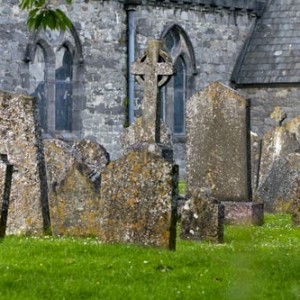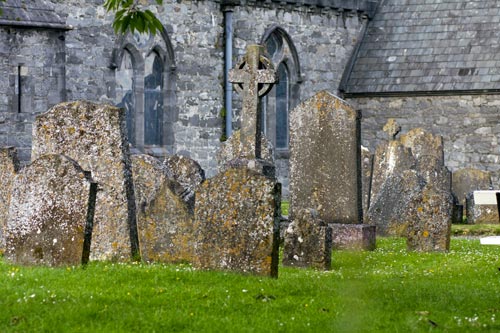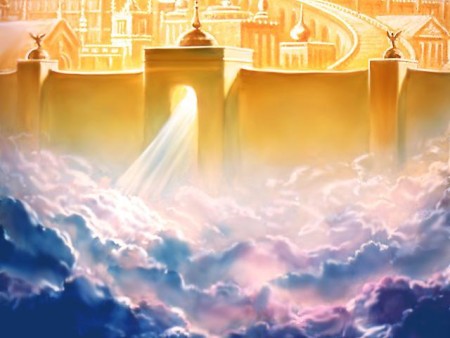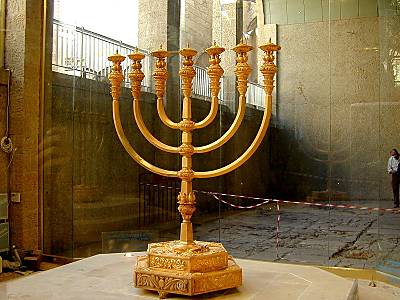Today is All Souls Day, the companion feast to All Saints Day. While All Saints Day celebrates those souls who enjoy the Beatific Vision in Heaven, today reminds us that there are still souls in purgatory, and in need of our prayers. While today is not a Holy Day of Obligation, it’s worth making it to Mass, or at least offering up a prayer for the faithful departed. Some of the form prayers are:
May the souls of the faithful departed, through the mercy of God, rest in peace.
And:
Eternal rest grant unto them, O Lord; and let perpetual light shine upon them. May they rest in peace. Amen.
Additionally, Catholics often make a cemetery visit to pray for the dead there (for many of the same reasons people go to cemeteries on Memorial Day).
Non-Catholics often object to two aspects of All Souls Day: Purgatory, and prayers for the dead. Let me address both points very briefly.
One of the strongest proofs for Purgatory comes from praying for the dead, as I’ll get to below. But additionally, the need for Purgatory can be observed in Revelation 21:22-26, in which St. John sees this vision of the Heavenly Jerusalem:
And I saw no temple in the city, for its temple is the Lord God the Almighty and the Lamb. And the city has no need of sun or moon to shine upon it, for the glory of God is its light, and its lamp is the Lamb. By its light shall the nations walk; and the kings of the earth shall bring their glory into it, and its gates shall never be shut by day–and there shall be no night there; they shall bring into it the glory and the honor of the nations. But nothing unclean shall enter it, nor any one who practices abomination or falsehood, but only those who are written in the Lamb’s book of life.
In that bolded part, we learn two of two exclusions from Heaven, separated by the word “nor”:
- One, that “nothing unclean shall enter” into Heaven.
- Two, that unrepentant sinners won’t enter Heaven (those who continue to practice “abomination or falsehood”).
Those going to Hell fall in to the second category: the sinner and his sin end up in Hell. But Purgatory relates to the first category. Note that here, the sinner isn’t kept out of Heaven, but the sin is. Note that it says that nothing unclean will ever enter Heaven, not that no one unclean will. So we can come in, but we have to leave our sins at the door. This process of purging away our sins is what Catholics call Purgatory.
For example, Christians who die in a state of grace, but with remaining sinful impurities need to have those cleansed from them. They can’t bring their sinful impurities into Heaven, nor will a Holy God simply overlook these sins. When we enter Heaven, we are no longer sinners. Sanctification is the process by which we go from being sinners to Saints. It begins here on Earth, and for some of us, will continue in Purgatory.
St. Paul describes this process using the imagery of passing through fire in 1 Corinthians 3:10-15:
According to the grace of God given to me, like a skilled master builder I laid a foundation, and another man is building upon it. Let each man take care how he builds upon it. For no other foundation can any one lay than that which is laid, which is Jesus Christ. Now if any one builds on the foundation with gold, silver, precious stones, wood, hay, straw– each man’s work will become manifest; for the Day will disclose it, because it will be revealed with fire, and the fire will test what sort of work each one has done. If the work which any man has built on the foundation survives, he will receive a reward. If any man’s work is burned up, he will suffer loss, though he himself will be saved, but only as through fire.
Remember, St. Paul is speaking only about followers of Jesus Christ in this passage. All of the builders he refers to start with the same Foundation: Jesus Christ. Some of these believers respond gloriously, living lives of gold, and silver, and gems.
Others respond less impressively. They believe, and they cling to that Foundation, but their lives as Christians are underwhelming — they’re building upon the precious Foundation of Jesus Christ with cheap materials: wood, hay, and straw. Immediately before that passage I quoted above from Revelation 21, John described in great detail the beautiful materials adorning the Heavenly Jerusalem: jasper walls, gems adorning everything, and gold so pure that it was transparent. There’s no place for wood, hay, and straw in the New Jerusalem: no room for mediocrity.
In other words, some Christians end their lives ready for Heaven. They’ve prefigured Heaven on earth through saintly lives. Other Christians, while saints, have a lot of work left to do before they’re ready for Heaven. St. Paul says of these that they will be saved, but that it will be only as through fire.
What’s the fire for? To burn up the mediocre and unworthy elements of the man, and make room for a proper relationship with Christ. Anyone who has ever tried to kick a bad habit (or even tried something as simple as fasting or dieting) knows how painful this can be, and how apt the imagery of fire can be.
It should be noted that it’s true that Purgatory isn’t unambiguously spelled out in Scripture, the way that Heaven is. But the same is true of Hell in the Old Testament. It exists (and is good to know about), but it’s the focus of Scripture, since it’s not where our heart should be. Ideally, we shouldn’t love and serve God out of fear of Hell or Purgatory, but out of love for Heaven… and Him.
This one is straightforward, but with a twist. In 2 Maccabees 12:42b-46, after the superstitious Israelites are slain, Judas Maccabees, their leader, responds with prayer and almsgivings for their souls, and Scripture tells us that this is commendable:
And the noble Judas exhorted the people to keep themselves free from sin, for they had seen with their own eyes what had happened because of the sin of those who had fallen. He also took up a collection, man by man, to the amount of two thousand drachmas of silver, and sent it to Jerusalem to provide for a sin offering.
In doing this he acted very well and honorably, taking account of the resurrection. For if he were not expecting that those who had fallen would rise again, it would have been superfluous and foolish to pray for the dead. But if he was looking to the splendid reward that is laid up for those who fall asleep in godliness, it was a holy and pious thought. Therefore he made atonement for the dead, that they might be delivered from their sin.
That’s incredibly clear. End of question, right? Well, not quite. Luther ultimately decided that this Book wasn’t inspired, and it’s not in the modern Jewish Old Testament. So Protestants today don’t accept it. Of course, we do, so the Scriptural basis for prayers for the day is clear.
In an earlier post, I suggested five answers to the Protestant opposition to Second Maccabees:
- On what basis can you show that 2 Maccabees isn’t Scripture? I’ve mentioned before nobody in the Early Church thought the 66-Book Protestant canon was the correct canon of Scripture. So if Protestants can’t show why their own canon is right, I don’t see how that’s a basis for rejecting 2 Maccabees.
- 2 Maccabees was believed to be inspired Scripture by the early Church. It’s affirmed as canonical by Origen, Augustine, Jerome, and a lot of other Fathers. Are there any reasons for believing we know better than them on this issue?
- There’s sound reason to believe Jesus treated 1 and 2 Maccabees as Scripture. The Jewish holiday Hanukkah celebrates the Maccabees’ re-dedication of the Temple. Both First and Second Maccabees call for it to be celebrated, and these are the only Scriptures which do so (remember, the Talmud and Mishnah weren’t written yet, and were never considered Scripture). And we see Jesus Christ Himself celebrating Hanukkah in John 10:22.
- Even if it isn’t Scripture, it’s still true. Even if one refuses to accept the Second Book of Maccabees as inspired Scripture, that doesn’t mean the Book is false. If you don’t want to treat it as Scripture, at least treat it as a history book. And it shows that the pious Jews of Israel believed in praying for the dead. Judas Maccabbeus calls for the praying, and there are no signs that anyone thinks this is strange. The author of 2 Maccabees even talks about how this practice proves that there’s an afterlife, something rejected by many of the Jews who rejected these Books (Luke 20:27). So the controversial part wasn’t that Judas was praying for the dead, but that there was an afterlife.
- Even if it were false, it’d still tell us something. Even if the author of 2 Maccabees were completely making up this account, we’d still be able to tell that some of the Jews before Christ believed in praying for the dead. After all, the author explicitly praises the practice.






Where is heaven unambiguously spelled out in scripture? The resurrection, I admit, is. But a heavenly intermediate state? Outside of a parabolic reference (Lazarus and Dives) that can be subjected to a metaphoric interpretation (or as referencing the resurrection) where do we get a clear picture of what the intermediate state will be like? This is why Martin Luther believed in Soul Sleep, no?
e.g. here’s a pretty extensive outline of the scriptural thoughts on the subject that concludes: “the biblical writers simply did not address our question directly, and perhaps our words are not sufficient to describe something that is beyond our experience.”
http://www.gci.org/prophecy/intermediate
HocCogitat,
I admit that the afterlife in general is often described in terms that are hard for us to grasp, which makes sense. Describing a place unlike we’ve ever seen or imagined is going to be something that’s not easily conveyed.
But I was more than a bit surprised by your link — at first, I was surprised to see anyone defending the notion of “soul sleep.” The references in Hebrews 12:1-3 about the Saints in Heaven surrounding us as a great crowd of witnesses dispel any idea that they’re asleep . So, too, does that parable in Luke 16 with Lazarus and the rich man. So, too, does the “harrowing of Hell,” as St. Peter explains in 1 Peter 3. (Christ ministers to the righteous dead, and opens the gates of Heaven to them — which makes no sense if they’re asleep).
But it turns out that Grace Communion International is the new name of the Worldwide Church of God. They’re a crazy group: their founder (and, for many decades, the denomination itself) rejected the Trinity. They’ve been trying to morph into a more mainstream Evangelical church, and so they’ve been reinventing their doctrines (and their name), but they’ve still got all sorts of weird beliefs hanging on.
Still, WCG / GCI aside, I take your point. Purgatory is described in opaque terms, but so is the afterlife generally.
God bless,
Joe
Ok, so maybe we agree now. But its not just the fringe. This was the position of Martin Luther, William Tyndale, and some Anglicans such as E. W. Bullinger, and whole sects such as Seventh-day Adventists and the Jehovah’s Witnesses. All of these people are interpreting the Bible. So, it seems that there is something to this, even if its ultimately wrong its not obviously wrong.
And, presumably, this is the position of modern Lutheran churches, too.
And (sorry for the triple post) if we put ad hominems aside, the actual substance of that article, I think, is pretty compelling for the position that soul sleep is a reasonable position. I actually think its interesting for a Catholic apologist like yourself because most Protestants are somewhat horrified by the view of soul sleep, but w/o the Catholic Church can they have any confidence its not true? According to ML, no.
If you check out John Martinoni’s website < http://www.biblechristiansociety.com >, he approaches explaining Purgatory completely from a biblical standpoint. It sounds like this is what you are looking for. He goes over the concepts of (1) there must be a place other than Heaven and Hell (2) There must be a process by which we are saved and (3) how some scriptural passages just don’t make sense without Purgatory.
Chris, thanks!
HocCogitat,
Fair point regarding Luther and soul sleep. I didn’t know that, actually. Modern Lutherans, to my knowledge, reject that view. See Myth #6 for the Lutheran Church-Missouri Synod’s view, for example (http://witness.lcms.org/pages/wPage.asp?ContentID=987&IssueID=54).
And this is certainly another reason why Scripture should be read through the prism of Tradition, and read with the Church. Once Luther decided he could just interpret things his own way, he came to all sorts of conclusions that conservative Christians today (including Protestants) would regard as false and dangerous: besides soul sleep, there were things like his approval of bigamy for Phillip of Hesse, and denial of the inspiration of various Books from both the Bible.
I’d say this: it’s only in a world in which you ignore the Church and Tradition that you could fall into the trap of soul sleep. But I’m still inclined to see the Scriptural argument, in isolation, as pretty overwhelming. The body “sleeps” while the soul is very much awake and alive.
You’ll note that the only passages that CGI thinks support the doctrine of soul sleep are pre-Resurrection. This is why the events described in 1 Peter 3 are important, because prior to that point, the just souls weren’t in Heaven. The New Testament describes the souls as rather more active in the afterlife. “To be absent from the body,” and all that.
God bless,
Joe
Maybe so. If you take the position that the NT is inspired your point is strong. But if you don’t, if you take the position that the Biblical authors were better journalists than theologians, what is odd is that you don’t find this teaching on the lips of Christ. And, though perhaps that is a strange position, I do find His never mentioning this extremely odd. Don’t you? I mean in some ways it seems like the most important revelation there is. And yet, nothing. We’re left to extrapolate.
Since you are a litigator, I’ll point out that this is a point pressed by Clarence Darrow:
“Now, I will tell you where all this nonsense came from. I know the idea of immortality had no connection with the soul. Jesus did not believe in a soul–and He is one of the High Priests we have heard mentioned. What did He believe in? He believed in the resurrection of the body. We lie in our graves, buried there perhaps a million years, and then we are going to get resurrected on Judgment Day, when they are going to divide the sheep and the goats, if there are any sheep. Then we are going to live again . . .”
http://books.google.com/books?id=EJPex-ce6UYC&lpg=PA79&ots=U6olxMUFs2&dq=clarence%20darrow%20jesus%20resurrection&pg=PA80#v=onepage&q=resurrection&f=false
I don’t understand Darrow’s claim. Jesus distinguishes between body and soul in places like Matthew 10:28, Mark 8:37, Mark 12:30, etc. I don’t see how he’s claiming that Jesus didn’t believe in a soul?
As for your own claim, look at Luke 23:43, Jesus’ words to the thief on the Cross. How do you understand that? God bless,
Joe
It’s a mistake to pit resurrection against a conscious intermediate state. That’s a straw man used by believers in soul sleep. Anglican bishop NT Wright refers to resurrection as “life after life after death.”. In other words, belief in resurrection says nothing about what happens between the death of the body and resurrection.
Moses was dead at the time of the Transfiguration, and yet appeared, awake.
Mary,
Some soul-sleep believers will argue that Jude 1:9 means that Moses was resurrected.
“While today is not a Holy Day of Obligation, it’s worth making it to Mass…” This made me chuckle, as if it weren’t worth going to mass every day! 🙂 Great blog and God bless!
Of the three cardinal virtues; faith, hope and love, the first two are temporary and the third is eternal. Faith and hope are “OBE” (overcome by events) for the souls in heaven/purgatory and hell because their choice has been cast. The souls in heaven experience God in the beatific vision. What need have they of faith? Love, however, is the distinguisher that all souls in heaven/purgatory possess and that the souls in hell do not. That’s also the important distinction that the Church and James make. Faith without love is as fruitless as the souls in hell. Love is faculty of the soul associated with the will and works are the product of the will. A love that refuses to act is no love at all. Jesus in so many parables talks about working in the field, but also makes it clear that it doesn’t matter whether it’s long or short, just that it perseveres right straight to and through heaven. It’s just so clear to me that “sola fide”, as a faith apart from love is a non-starter.
What do you make of Ratzinger’s own curious thoughts on this subject which seem to reduce immortality in general to a kind of non-event that we can dismiss now that we are smarter than prior generations?
‘Resurrection’, he writes, ‘expresses the idea that the immortality of man can exist and be thought of only in the fellowship of men’. The doctrine, he claims, creates a ‘curious dilemma’ because modern liberal theologians no longer believe that body and soul can be identified as separate entities, something that Ratzinger dismisses, together with the immortality of the soul, as a Greek notion which has ‘become obsolete’.
And he says Christ is ‘the one who died on the cross and to the eye of faith, rose again from the dead’
http://www.banneroftruth.org/pages/articles/article_detail.php?1820
HocCogitat,
That article was just chock full of misrepresentations and inaccuracies. I started to respond, but then turned it into a post, which gave me an excuse to exhibit lots of Last Judgment art.
I.X.,
Joe